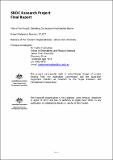Defeating the Autumn predictability barrier : SRDC Final report JCU027
Abstract
The success of an Australian sugarcane cropping season depends on rainfall and the ability to
forecast it. The benefits associated with long range rainfall forecasts to reduce the risk and
uncertainty associated with decisions impacted by rainfall variability has become increasingly
recognized by industry. There are several crucial decisions that must be finalised by March and are
severely effected by climate conditions during September to November. These types of decisions
had to be made without the aid of climate forecasting technologies owing to the autumn
predictability barrier, or, more formally, the austral autumn persistence barrier. Around March,
April and May traditional rainfall indicators like the southern oscillation index (SOI) and the Niño
3.4 index are unable to reliably forecast across the autumn time zone. To help industry improve
preparation for the season ahead, a forecasting system that could provide reliable forecasts about
end of season rainfall, early in the year, was needed. Industry makes many decisions at the beginning of the year (e.g. January to March) that are
heavily affected by harvest rainfall. Decisions such as when to start the harvest season have an
enormous impact on industry profitability (refer Figure 1). Prior to JCU027, industry had no access
to climate forecasting technologies that would assist with these types of decisions owing to the
austral persistence barrier. Project JCU027 has overcome this severe limitation and described and
tested an approach that allows industry to consult climate forecasts when considering harvest and
mill start dates, and planning harvesting scheduling strategies.
Collections
Related items
Showing items related by title, author, creator and subject.
-
Dry forecast prompts need to develop an irrigation plan
Unknown author (Sugar Research Australia Limited, 2015)With an El Nino weather pattern in place over winter and the forecast for an increased likelihood of lower rainfall for the coming summer, cane farmers with irrigation supplies are being reminded of the opportunities that ... -
How much nitrogen will that crop need? Incorporating climate forecasting to improve nitrogen management in the Wet Tropics : Final project 2015/075
Everingham, Y; Biggs, J; Schroeder, B; Skocaj, D; Thorburn, P; Sexton, J (Sugar Research Australia Limited, 2018)Determining the optimum amount of nitrogen that is required by the crop to maximise production, profitability and environmental outcomes is a challenging problem. The modelling approach taken in this project has balanced ... -
Climate forecasting to improve nitrogen management in the Wet Tropics
Rodman, G; Skocaj, D (Sugar Research Australia Limited, 2016)SRA researcher Danielle Skocaj's PhD thesis investigated the impact of climatic conditions on Tully sugarcane yields and nitrogen fertiliser requirements. She found that climate forecasting can be used to predict N ...

